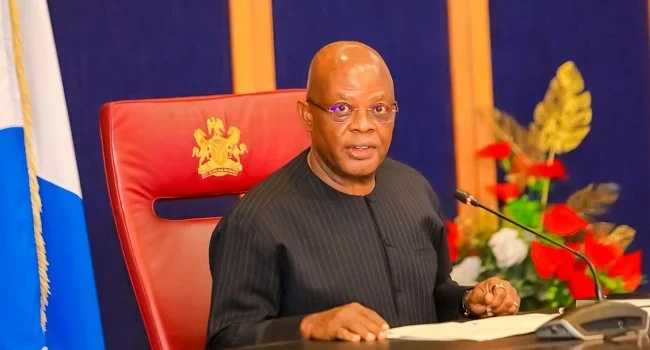Ibas Prepares for Democratic Transition as Emergency Rule Ends

Port Harcourt, Nigeria – September 13, 2025 – Rivers State, Nigeria’s oil-rich economic hub, is set to formally transition back to democratic governance following a six-month state of emergency declared by President Bola Ahmed Tinubu on March 18, 2025. The emergency rule, which suspended the state’s elected officials and institutions, was instituted to address a severe political crisis that threatened a “total breakdown of law and order.” With the mandate now fulfilled, retired Vice Admiral Ibok-Ete Ekwe Ibas, the state’s sole administrator, has initiated activities to mark the return to civilian rule, starting with an inter-denominational thanksgiving service on Sunday, September 14, 2025.
Background: A State in Crisis
The state of emergency was declared amid a prolonged power struggle between Governor Siminalayi Fubara and his predecessor, Nyesom Wike, now the Minister of the Federal Capital Territory. The conflict, rooted in political control and resource allocation, led to legislative paralysis, with the Rivers State House of Assembly split into factions. Tensions escalated with incidents of violence, including attacks on public infrastructure, prompting President Tinubu to invoke Section 305 of the 1999 Constitution. This extraordinary measure suspended Governor Fubara, his deputy, Professor Ngozi Odu, and the entire state assembly, consolidating executive and legislative powers under the presidency.
Retired Vice Admiral Ibok-Ete Ibas, a former Chief of Naval Staff (2015–2021) and Nigeria’s former Ambassador to Ghana, was appointed as the sole administrator to stabilize the state. His mandate included restoring order, ensuring security, and overseeing the conduct of credible local government elections to pave the way for a return to democratic governance.
Mandate Fulfilled: Local Elections and Stability
On Friday, September 12, 2025, Administrator Ibas received the official report from the Rivers State Independent Electoral Commission (RSIEC) on the local government elections held on August 30, 2025. Speaking at the Government House in Port Harcourt, Ibas declared that the presidential mandate had been “sufficiently achieved.” He commended the peaceful and transparent conduct of the polls, noting that “nobody was harassed, and people freely made their choice of leaders.” The successful elections, which saw the swearing-in of new local government chairmen, marked a critical milestone in restoring democratic processes.
The elections followed a period of relative calm under Ibas’s administration, which prioritized security and public engagement. His efforts were further underscored during a closed-door meeting with President Tinubu on September 3, 2025, at the Presidential Villa in Abuja. The over two-hour discussion focused on winding down the emergency rule and ensuring a seamless transition, reflecting the federal government’s close oversight of the process.
Transition Activities: A Thanksgiving Kickoff
The formal transition to democratic governance begins on Sunday, September 14, 2025, with an inter-denominational thanksgiving service at the Ecumenical Centre on Abonnima Wharf Road, Port Harcourt. According to a statement by the Secretary to the State Government, Professor Lucky Worika, the event is designed to express gratitude for the stability achieved during the emergency period. Administrator Ibas will attend as the Special Guest of Honour, symbolizing the closure of his interim role.
The service is expected to draw a diverse group of attendees, including:
- Permanent secretaries
- Newly sworn-in local government chairmen
- Heads of security and para-military agencies
- Traditional rulers
- Captains of industry
- Other government officials and invited dignitaries
The event underscores a collective reflection on the resolution of a crisis that had threatened the stability of the Niger Delta’s economic powerhouse. It also sets the stage for the reinstatement of the state’s elected officials, including Governor Fubara and the state assembly, unless further federal directives indicate otherwise.
Context and Controversy
The six-month emergency rule was a rare and contentious intervention in Nigerian state governance. Critics, including the Nigerian Bar Association (NBA), the People’s Democratic Party (PDP), and various civil society groups, initially condemned the declaration as an overreach of federal power, arguing it undermined democratic principles. Supporters, however, viewed it as a necessary measure to prevent chaos in a state critical to Nigeria’s oil-driven economy.
The crisis in Rivers State had far-reaching implications, given its role as a major contributor to national revenue through oil and gas production. The political feud between Fubara and Wike, a former governor with significant influence, exposed deep-seated issues of loyalty, patronage, and control over state resources. The emergency rule, while stabilizing the situation, sparked debates about federal-state relations and the limits of presidential authority.
Public Sentiment and Next Steps
Public reactions, particularly on social media platforms like X, have been a mix of optimism and reflection. Posts circulating online highlight the thanksgiving service as a moment of unity and hope for renewed governance. However, some voices continue to debate the legacy of the emergency rule, with opinions split between those who see it as a necessary intervention and others who view it as a setback for democratic norms.
As Rivers State prepares to resume full democratic governance, attention will shift to rebuilding trust among political actors and addressing the underlying tensions that fueled the crisis. The reinstatement of the state assembly and the governor’s office will be closely watched, with expectations that the new local government leadership will strengthen grassroots administration.
Looking Ahead
The transition marks a pivotal moment for Rivers State as it seeks to move beyond a turbulent chapter. The successful conduct of local elections and the peaceful atmosphere under Ibas’s administration provide a foundation for renewed stability. However, the state’s political future will depend on the ability of its leaders to bridge divides and prioritize governance over personal rivalries.
The thanksgiving service on September 14, 2025, is not just a ceremonial event but a signal of Rivers State’s readiness to reclaim its democratic path. As the state looks forward, the focus will be on fostering reconciliation, ensuring accountability, and sustaining the peace that has been hard-won over the past six months.







